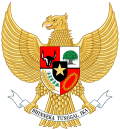First Development Cabinet Kabinet Pembangunan I | |
|---|---|
| 28th Cabinet of Indonesia | |
| 1968–1973 | |
 | |
| Date formed | 10 June 1968 |
| Date dissolved | 27 March 1973 |
| People and organisations | |
| Head of state | Suharto |
| Head of government | Suharto |
| No. of ministers | 25 ministers |
| Member party | Indonesian National Armed Forces Indonesian National Party Indonesian Christian Party Nahdlatul Ulama Indonesian Muslim's Party Independent |
| History | |
| Predecessor | Ampera II Cabinet |
| Successor | Development II Cabinet |
| ||
|---|---|---|
Pre-presidency Domestic policy Foreign policy Post-presidency Family
| ||
| Gallery: Picture, Sound, Video | ||
The First Development Cabinet [1] (Indonesian : Kabinet Pembangunan I) is the name of the cabinet of the Indonesian government led by President Suharto. This cabinet was announced on 6 June 1968 and served from 10 June 1968 until 27 March 1973. The composition of this cabinet is not much different from the composition of ministers in the Revised Ampera Cabinet. Shortly after the 1971 election, on 9 September 1971, President Suharto announced a reshuffle of the First Development Cabinet and appointed the reshuffled ministers on 11 September 1971.
Contents
- Cabinet leader
- Cabinet members
- Ministers
- Official with ministerial rank
- Reshuffle
- Given another assignment
- Reshuffle Cabinet appointments
- Notes
- References
- Book
- Newspapers and others
The main tasks of the cabinet, as stipulated in MPRS Decree No. XLI/MPRS/1968 and known as Panca Krida, were:
- Creating political and economic stability as the unnegotiable prerequisite for the success of the Five Year Development Plan and the Legislative Election.
- Organizing and executing the Five Year Development Plan.
- Holding Legislative Elections on 5 July 1971 at the latest.
- Restoring order and security to society by finishing off the leftovers of 30 September Movement and every threat, abuse, and betrayal of Pancasila and the 1945 Constitution.
- Continuing the universal reform and purge of the state apparatus at National and Regional Level.
On 1 April 1969 the implementation of First Pelita (1969–1974) began. The purpose of holding First Pelita is to improve the people's standard of living and at the same time lay the foundations for development in the next stage. While the targets are food, clothing, infrastructure improvement, public housing, expansion of employment opportunities, and spiritual welfare. The focus of First Pelita is the development of the agricultural sector in accordance with the aim of pursuing economic backwardness through the process of reforming the agricultural sector, because the majority of Indonesia's population still lives from agricultural products.




































